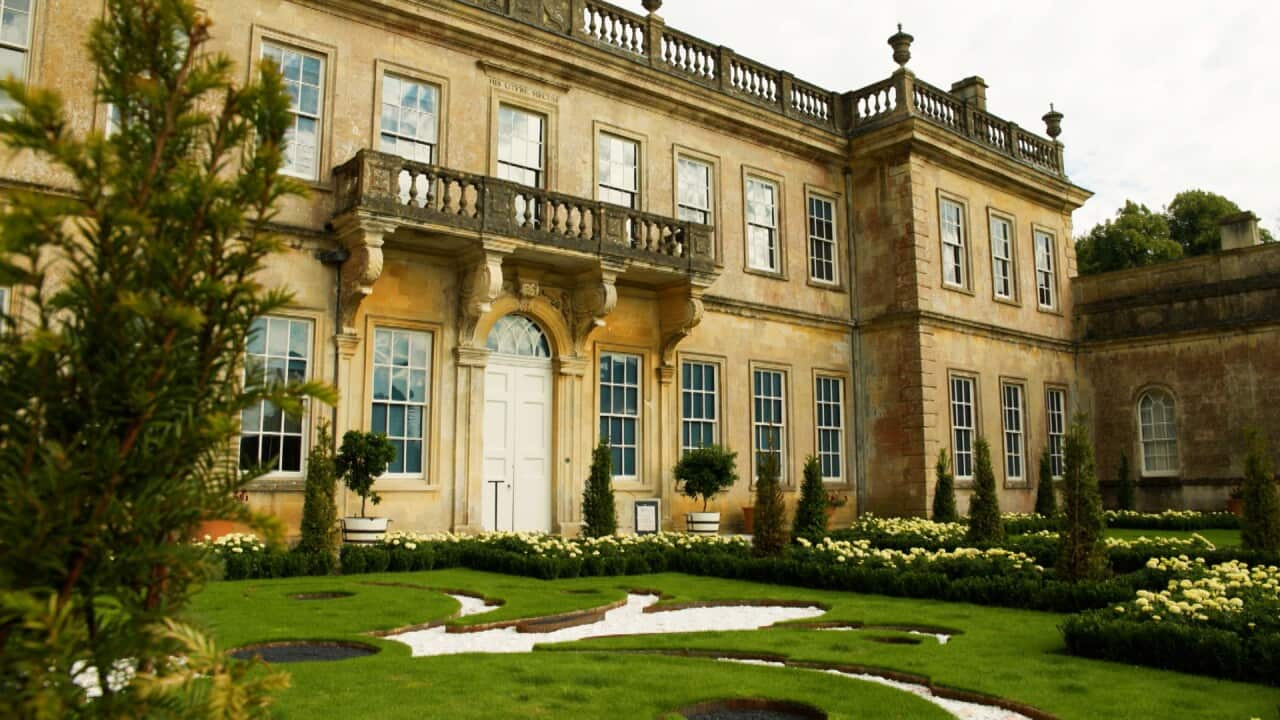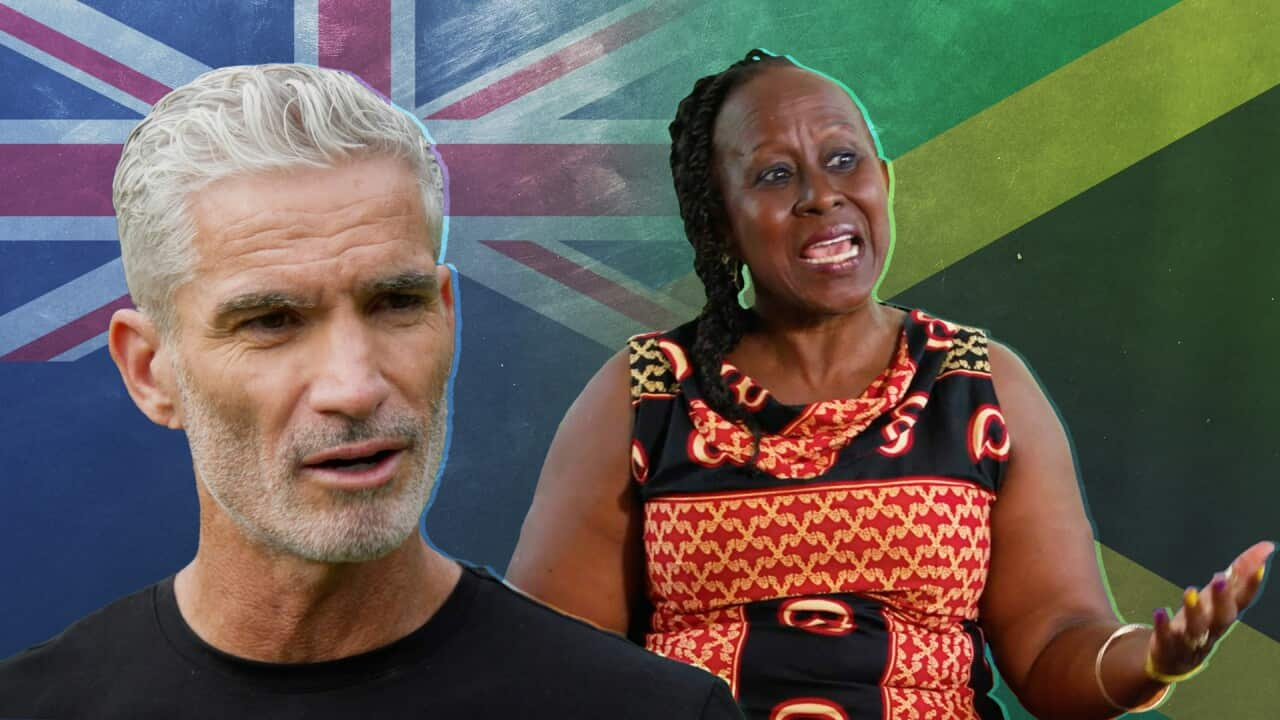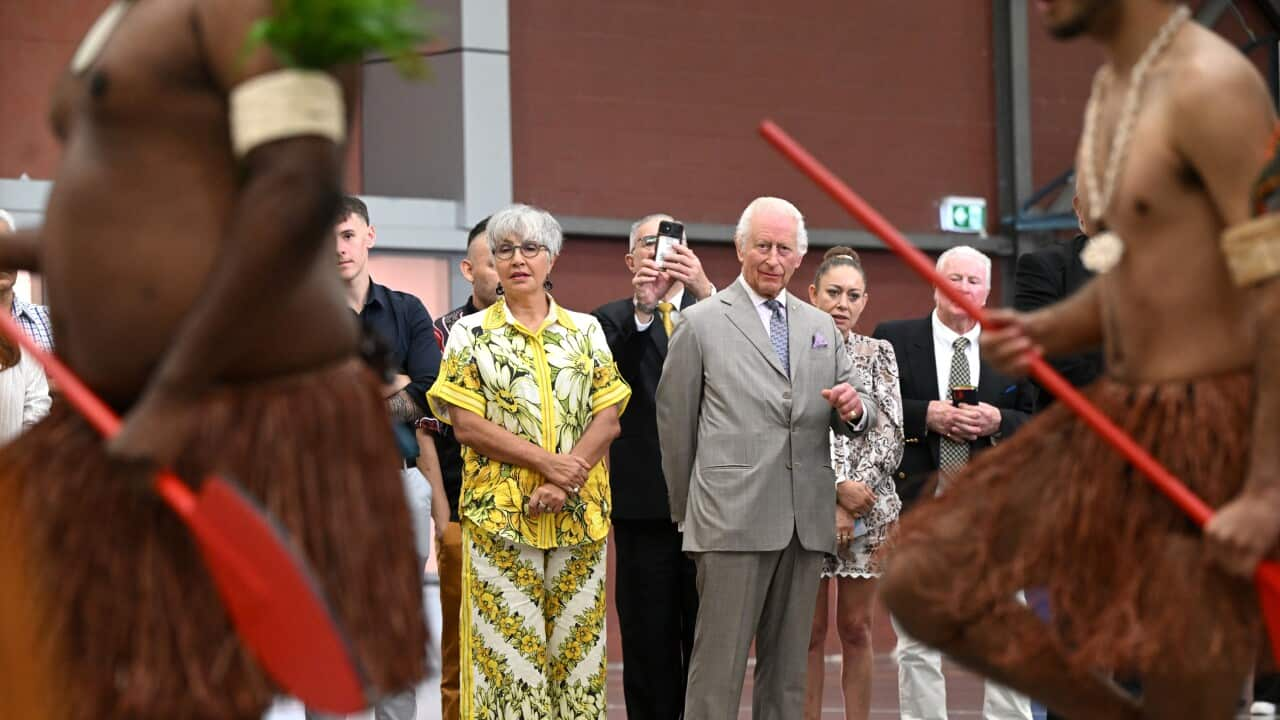Watch Dateline's latest episode Britain’s Woke History Wars on SBS On Demand.
Stream free On Demand

Britain's Woke History Wars
episode • Dateline • News And Current Affairs • 24m
episode • Dateline • News And Current Affairs • 24m
Two carved figures depicting kneeling black men are displayed at the back of a room in the upstairs of Dyrham Park, a 17th century mansion in the rolling hills of the Bath countryside in Britain. The figures, chained at the ankles and neck, are holding scallop shells above their head.
Alison Copper, a local volunteer at the house, explains that the stands would have been used to hold potpourri or confectionary.
"They would have been literally part of the furniture that that nobody would have thought anything about particularly, which shows how attitudes and things have changed," she told Dateline.
These disturbing objects remind the tourists wandering through the property that English country estates like Dyrham Park were symbols of wealth power and influence from an era when the British Empire thrived through colonisation and slavery.

Statues of chained black men are displayed at Dyrham Park, highlighting its former owner's connection to Britain's history of colonisation and slavery. Source: SBS
"I personally think that we're showing the house as it was," she said. "As long as it’s got context around it, this is just showing this is slavery in plain sight."
Dyrham Park once belonged to William Blathwayt, who held positions including secretary of the Lords of Trade and Plantations and auditor general of royal revenues in the colonies. While he didn't own slaves or plantations, his job as an administrator was to keep money flowing from colonies back to Britain. The house as it stands today was largely created with the money he made.
Dyrham Park is one of 500 properties owned by the National Trust, a charity organisation set up in 1895 to preserve historic landscapes and buildings.
In its 2020 report, the National Trust identified 93 of its properties as being linked to colonisation and slavery. Dyrham Park was among them.
While places like Dyrham already included references to history of colonisation and slavery, over time it was made a more significant part of their curation.
The organisation said it had already been updating its digital content and reviewing visitor information to include appropriate context.

Glasgow Museums curator Patricia Allan has made it her life’s work to return artefacts to their countries of origin. Source: SBS / Dateline/ Simon Phegan
A culture war over Britain’s past
In a 2024 survey by the National Centre for Social Research on British identity only 64 per cent of Britons said they were proud of their history, compared with 86 per cent in 2013.
The UK-based group Heirs of Slavery, formed in 2023, is made up of people whose ancestors benefitted from the transatlantic slave trade. They’ve sought to apologise for the past and campaign for reparative justice for former colonies.
Bristol-based historian and writer Edson Burton says the British identity is changing, and with that comes a reassessment of how the nation views and presents its past.
"As new voices, the voices of people from the new Commonwealth have now become British voices and they're questioning who are these icons of British history?" he said.
"What are the things that we celebrate?"

Bristol-based historian and writer Edson Burton says the British identity is changing, and with that comes reassessment of how the nation views and presents its past. Source: SBS / Dateline/ Simon Phegan
Nigel Farage and his right-wing political party Reform UK (formerly the Brexit Party) is one of the loudest in the "anti-woke" movement.
On his official YouTube channel, Farage is rallying pride in British history, saying: "We are teaching kids now that the empire was truly evil".
"Our kids are being told that everything about our past is poisonous," he said in one video.
Cornelia van der Poll, one of the founders of a grassroots organisation called Restore Trust, is concerned about the National Trust’s approach to the stories it is telling about its properties.
"In some cases, there's such a strong desire to put the emphasis on slavery or colonial links, for example, that some really important aspects of the property are underplayed or not given the spotlight in the way that they might be," she told Dateline.

Cornelia van der Poll and her organisation Restore Trust are concerned by the National Trust’s revised approach to storytelling. Source: SBS / Dateline/ Simon Phegan
Van der Poll says: "We're not trying to hijack the council of the National Trust. We're trying to introduce real expertise and diversity of thought."
"The National Trust does not have history as one of its charitable objects, so it doesn't have the established expertise in that area."
Tom Boden, the National Trust’s manager at Dyrham Park, believes "it's absolutely within our remit to look at the full history of our places" and “do that in a way that is informed by the best quality research that is sympathetic to listening to different communities and how they respond to that".
"The role of William Blathwayt in the administration of empire means that it's absolutely important for us to be focusing on that history and understanding the continuing legacies," he said.
Repatriating artefacts
The National Trust is not the only institution changing its approach.
Patricia Allan, a curator at Glasgow Life Museums, has made it her life’s work to return artefacts to their countries of origin.
"I feel that we are effectively harbouring stolen property or property that was taken illicitly, certainly without consent," she said.

Glasgow Life joined a number of UK and European museums in promising to return Benin Bronzes taken from the kingdom of Benin —now part of modern Nigeria — during the British occupation in the late 19th century. Source: SBS
"Glasgow Life considers the right of the people or person to represent the culture or the community or those ancestors," she said
"Really, we have no right to decide what happens to something when it goes back because many, many objects are not for museums."
Allan says repatriation is a bureaucratic process that can take years but the difference here is they are actively seeking out the rightful resting place for remains and artefacts.
Some of the items waiting to go home next are the Benin Bronzes, a collection of sculptures taken out of the kingdom of Benin, located in what is now southern Nigeria, during the brutal British occupation in the late 19th century.

Nigerian-born Glaswegian Jideofor Muotune is bringing together artists and poets to tell the stories of the Benin Bronzes. Source: SBS / Dateline/ Simon Phegan
In the UK, some museums, including Glasgow Life, also returned Benin Bronzes to Nigeria, hundreds still remain.
For Nigerian-Glaswegian Jideofor Muotune the answer is simple.
"These bronzes were made to tell stories, the histories, following our wonderful West African traditions of not necessarily writing things down," he said.
"It's a really uncomfortable feeling seeing them in a glass box in Glasgow.
That's not where they were meant to be."
Watch more Dateline
Stream free On Demand

Breaking Up With Britain





